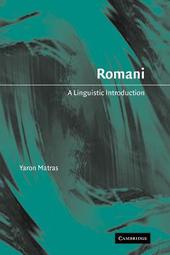
|
Romani: A Linguistic Introduction
Paperback / softback
Main Details
| Title |
Romani: A Linguistic Introduction
|
| Authors and Contributors |
By (author) Yaron Matras
|
| Physical Properties |
| Format:Paperback / softback | | Pages:308 | | Dimensions(mm): Height 228,Width 152 |
|
| Category/Genre | linguistics
Sociolinguistics |
|---|
| ISBN/Barcode |
9780521023306
|
| Classifications | Dewey:491.497 |
|---|
| Audience | | Professional & Vocational | |
|---|
| Illustrations |
1 Maps
|
|
Publishing Details |
| Publisher |
Cambridge University Press
|
| Imprint |
Cambridge University Press
|
| Publication Date |
24 November 2005 |
| Publication Country |
United Kingdom
|
Description
Romani is a language of Indo-Aryan origin which is spoken in Europe by the people known as 'Gypsies' (who usually refer to themselves as Rom). There are upwards of 3.5 million speakers, and their language has attracted increasing interest both from scholars and from policy-makers in governments and other organizations during the past ten years. This 2002 book is the first comprehensive overview in English of Romani. It provides a historical linguistic introduction to the structures of Romani and its dialects, as well as surveying the phonology, morphology, syntactic typology and patterns of grammatical borrowing in the language. This book provides an essential reference for anyone interested in this fascinating language.
Author Biography
Yaron Matras is Lecturer in Linguistics at the University of Manchester. He has published numerous articles in academic journals on various aspects of language contact, linguistic typology, descriptive linguistics and sociolinguistics of Kurdish, Domari, Turkish, German dialects, and other languages. He has also published extensively on Romani, including the monograph Untersuchungen zu Grammatik und Diskurs des Romanes (Dialekt der Kelderasha/Lovara).
Reviews"Matras...has planted on the sands a massive boulder of contribution to knowledge that will not be swept away by any tides." American Journal of Sociology "The book will be of tremendous use to a broad range of scholars -- not only linguists but also social scientists and other students in various humanistic disciplines. There is nothing like it available in any language, and it fills a pressing need." Romani Studies
|